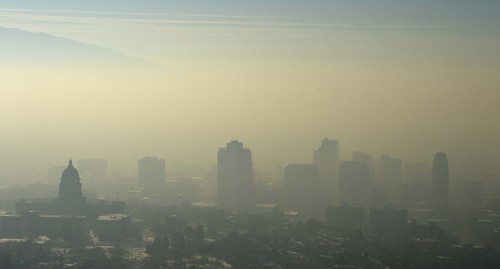This is an archived article that was published on sltrib.com in 2014, and information in the article may be outdated. It is provided only for personal research purposes and may not be reprinted.
Air pollution was public enemy No. 1 this legislative session — the subject of polls, petitions, protests and more than two dozen proposals for scrubbing Utah's smog-laden skies.
But, in the end, only a third of those bills passed and not the real "game changers," according to a consortium of clean-air advocates who are calling on the public to continue to press policymakers for meaningful change.
"Compared to past, recent sessions where [regulatory] funding was cut and bills were passed to insulate polluters from regulatory scrutiny and legal challenge, we feel that for the first time ever, a small step was taken in the right direction," Clean Air Now president Carl Ingwell said Tuesday at a Capitol Hill news conference. "Nonetheless, there is still an enormous gap between what needs to be done, what the public wants done, and what the Legislature was willing to do."
Ingwell's group joined others to produce a report card, grading the "clean air" performance of Utah's political leaders based on votes cast, bills carried and bills passed.
Utah Gov. Gary Herbert received a B for supporting the state's move to cleaner fuels, an inversion-season wood stove ban in areas with poor air quality and SB164, which would have allowed state regulators to adopt more stringent air standards than those enforced by the Environmental Protection Agency (EPA).
The House received a B minus, in part for voting 58-0 to pass HB388, which would have allowed cities and counties to ask voters for a tax increase dedicated to public transit.
But for failing to vote on that bill, and three others, the Senate received a D.
The Senate also stripped enforcement provisions from Rep. Patrice Arent's wood-burning bill, HB154. The pared-down version provides $1.5 million to subsidize the transition from wood-burning stoves to natural gas furnaces for 200-plus homes.
Burning is the only source of heat in the targeted homes, which are located in regions that are out of compliance with EPA air quality standards, called non-attainment areas.
That bill was among eight that lawmakers did pass, including tax credits and grants to replace "dirty diesel" school buses, and to encourage consumers to purchase low-emission cars and ditch their wood-burning stoves.
They approved a bill barring incinerators from being located within two miles of homes and a resolution to facilitate the relocation of medical waste incinerator Stericycle from North Salt Lake to a remote site in Tooele County.
"The joint resolution is a good step forward," said Alicia Connell, co-founder of Communities for Clean Air. "But it's not fair to Tooele residents."
Lawmakers who championed clean-air initiatives, such as Arent, D-Millcreek, were given A's.
Those who actively fought the cause were given F's. Of 23 failing grades in the House, 19 went to those representing non-attainment areas.
Utah County representatives received the most failing grades.
Of seven failing grades in the Senate, six went to those representing non-attainment areas.
"Clean-air groups understand that the legislative process begins many months before the session commences, and with a few exceptions, this year's rush of clean-air bills came very late in the process," said Ingrid Griffee, a volunteer lobbyist for Utah Moms for Clean Air. "So in many respects we're not surprised or disappointed at this year's outcome."
But, she added, "it's also important that citizens understand how clean air was sacrificed at times to ideological purity, like 'taxes will not be raised no matter what,' a vague reluctance to not change the status quo, or the commanding influence of industry lobbyists."
Activists hope their report card is a reminder for residents to hold lawmakers accountable and to continue to fight to be heard over industry lobbyists.
"We need to turn this whole system on its head and remind lawmakers that the real backbone of our economy are families and voters," Griffee said, " ... and the most precious resource we have in Utah is not oil or gas, it's our children."
Next year, advocates pledge to narrow their focus and push a smaller number of bills, but with "game-changer" potential. Such measures include: creating an autonomous Wasatch Front air quality district that allows polluted areas to create programs and rules without binding the rest of the state; making a larger commitment to mass transit; and reining in fossil fuel development in the Uinta Basin.
"We expect a much better performance from the Legislature next year as a whole," said Brian Moench with Utah Physicians for a Healthy Environment.
Tribune reporter Brian Maffly contributed to this story. —
Investigating Utah air quality issues
• More than one-third of Utah school buses "dirty"
For more on Utah air quality coverage
o For more coverage from The Salt Lake Tribune on Utah's air quality, visit http://www.sltrib.com/topics/UtahAQ



